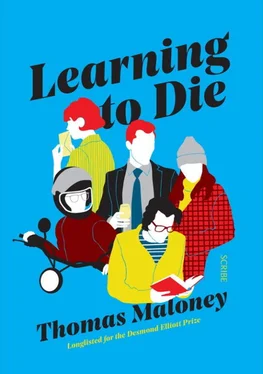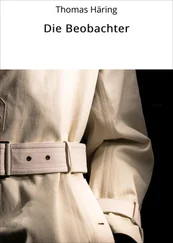On the long drive round the M25 to Stratford, the topic of James cropped up a few times. Gritted teeth from Natalie, reluctance, even now. Memories that shine a light on life choices and life outcomes, perhaps. A loser James may be, but he can still take the bins out. Dan is slowly coming to accept that there will be no great opening of hearts. Their relationship is strong but also bounded.
They drove home in silence, weary and hoarse from cheering on the titans.
Natalie ducks under the shop’s porch and shakes herself down. As she stalks past the fruit and veg, her foot slips on the wet floor and she flails wildly to stay upright. ‘Oh, no you don’t,’ she whispers. No room for her to get injured these days — no slack in the system.
The item she needs is shelved meaningly between the condoms and the tampons, in the aisle reserved for accessories to adult life — razors, deodorant, multi-vits. But as she nears the tills, first her eye and then the rest of her is drawn up a different aisle, one she always skips on the weekly round. First, a preparatory run of dog and cat food, and then — babies. Faces like grinning, gap-toothed pumpkins, everywhere you look. Giant shrink-wrapped slabs, seventy-two nappies in each, are on offer: three for two. How much do babies crap? Baby-dry, baby-snug, baby-soft, huggie-snuggie-snot-nosed-cherub. Stacked crates of baby formula look like something you’d see at a builder’s merchant. Nappy bags. Breast pumps.
She couldn’t do all this, and look after Dan as well. Could she? Should she? No slack in the system. She retreats to the tills, tosses the test on the nearest conveyor belt and avoids eye contact.
The rain stops abruptly but Dan stays on for a moment, listening to the daytime traffic as it calmly, sedately shears the flooded streets. He should be working, but instead he’s been reading about the law. He already knows that euthanasia and assisted suicide are illegal in England, but it’s worth making sure. A patient can refuse treatment, and indeed can issue legally-binding instructions in advance. Yes — his leaflets told him that. In other words, the illness is allowed to kill you, to play God, but no one else is. What if the illness doesn’t play a decent god? What if it takes you far enough to make life utterly miserable, whimpering at the roadside of existence, and won’t finish you off with a spade? It’ll be alright, the illness whispers, with a malevolent wink — trust me.
The law is an ass, but Dan is not the person to fight it. He’s not prepared to spend his last days on earth making adversaries of principled, well-intentioned fellow men and women. Nor is he the person to ‘raise awareness’ by getting his face in the papers, or, for that matter, the person to raise hard cash for research. He leaves these worthy tasks to others.
Is he selfish? He hopes not. In the cause of science, not his own, he has signed up to all the trials he ticks the boxes for, although most have disappointingly modest ambitions — counselling therapies, a better way of tracking symptoms, an adjustable collar. Magic healing potions are conspicuously absent. Apart from the trials, rather than reinvent himself, Dan has decided to live his life according to the same principles he hazily espoused before his diagnosis, but to follow them more strictly: do what you’re good at; do what you love; do what you think is right.
If, thanks to Dan’s elaborate ranks of magnets, the synchrotron can deliver to its customer experiments shades and flavours of blinding light that it couldn’t when he began, and if those shades and flavours help to answer questions that couldn’t be answered before (the tuberculosis team did get their image; a grainy print-out is taped to the wall by his makeshift desk), and if just one of his sixteen published papers — or his work still in progress — ends up nudging human understanding in the right direction, he’ll have achieved something.
If he manages to find pleasure and wonder in the world, even as his means of engaging with it disappear one by one — yesterday he took a nostalgic mathematical tour through Maxwell’s equations and their many elegant implications — he’ll have achieved something else.
And if he somehow succeeds in bequeathing Natalie, and his family and friends, a legacy of good feelings, feelings that engender strength and self-belief rather than despair, he’ll have achieved something yet more. Success and failure are both assured; achievement comes in the shades and flavours.
Dan concentrates for a moment to execute a swallow, and again to effect a satisfyingly deep sigh. It is somehow reassuring to be reminded how lightly he has touched the world. This room, the moulding on this window frame, the tiny heart-shaped pock of rust on the fastening — they were here before him, and will be here long after he’s gone: quietly, effortlessly existing.
At first, Brenda Vickers finds herself to be quite an attraction at the sheep station. The shepherds and shearers see few enough women, it seems, fewer even than the dour Highland foresters, and fewer still who’ll fearlessly try their hand at manhandling a ram or herding a deafening woolly torrent through the chute. Any uncouth behaviour from the men is returned in kind.
She spends a few evenings at the bar with a gentle veterinary student from Argentina who’s finding the job less pleasant than he bargained for. He’s a mountaineer of sorts back home — Brenda forgives him some mild exaggeration — he has a good heart and his accent is gorgeous. They like each other — they have no particular reason not to. But it’s not the same. There’s a missing ingredient whose taste she can still remember. If this is an experiment, the results are clear.
Meanwhile, a few of the shearers realise that she’s not quite right, not quite normal. They remember her put-downs and turn mean. ‘Keep calm, boys,’ they murmur when she passes, hands shaking in mock fear, exchanging grins at the running joke. Austin, so contented when she arrived, finds out and reacts with fury.
She also misses, more than she expected — there are mountains here, after all — the ancient, storm-rounded, midge-swept hills of home. She can’t stay.
Meanwhile, James F. Saunders collides head-on with a job — one he would have found intolerable before his encounter on the Shepperton lawn. After determining that Whitby Library does not hold a copy of Nerval’s Sylvie , which he has a sudden, scholarly yen to reread, James locates it in the town’s bookshop. Unwilling to fork out ten pounds for the slim volume, he starts reading on the shop floor. Between chapters he moves about, pretending to browse, brushing his fingers over the neatly-stacked wares. The shelf bearing Salinger, Sarraute and Sayers registers no particular significance. He frowns, then smiles — the shimmer and the scorn have quite disappeared. He might as well be in a hardware shop.
After a hundred pages he’s politely accosted by the manager, a sardonic, savvy woman in the late stages of pregnancy. They start talking about Nerval and the Romantic movement, and one thing leads to another.
‘We’re looking for someone prepared to work weekends,’ she explains, hesitantly. ‘For six months. After that — we’ll see.’
‘Weekends mean nothing to me, except fewer buses.’
‘Are you mobile? You could move here, to Whitby, perhaps.’ James thinks of his meagre possessions, and his pariah status in Bay.
‘Yes, I could do that.’
So he finds a flat, still within earshot of the sea; gives notice to Mrs Peacock, promising to visit. Counts the days, and measures his internal adjustments. ‘You haven’t changed,’ Becks said when they met, her tone measured, deliberately neutral. She couldn’t see, in that moment, what he’s become. Or maybe she could see precisely what he’s become, or what he hasn’t become, as the world has grown up around him. The friends, the admiring disciples all gone now. The nightclubs unwelcoming or closed down. The attitude unbecoming.
Читать дальше












